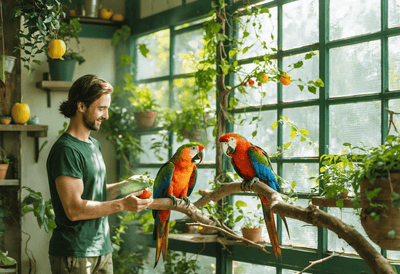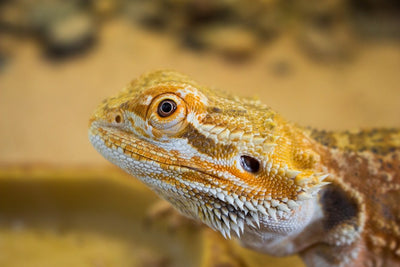Reptiles need special attention and care. They come from a different habitat than most household pets, which means you need to equip yourself with the right tools and supplies to ensure their health and happiness. Not only that, but owning reptiles has become increasingly popular over the years, and with that comes a vast array of reptile supplies to choose from. In this article, we’ll highlight some of the essential reptile supplies that will provide your cold-blooded pet with a comfortable and healthy life.
Reptile Tank
The size of the tank you choose for your reptile depends on the species' size and the number of reptiles you plan to keep in it. For instance, small lizards like geckos require a smaller tank, while larger reptiles like bearded dragons need more space. Ensure you learn the space requirements of your reptile to get the right size tank. You want your pet to have enough space to move around and stretch out.
Substrate is the material that covers the bottom of the enclosure. It is essential for reptiles that need to burrow, hide, and lay eggs. The substrate you choose should be safe and comfortable for your pet, as well as easy for you to clean. You should also provide hiding spots like rocks logs or caves to help your reptile feel secure.
Reptiles produce waste, which can accumulate in the tank and cause health problems. Regularly cleaning the tank is essential to avoid your pet living in unhygienic conditions. Spot clean daily and do a complete clean every four weeks. Remove any leftover food, feces, and remove any water that has evaporated or absorbed.
Reptile Lighting and Heating
Reptiles require specific lighting to thrive in captivity. In the wild, they receive natural sunlight which provides them with the necessary UVB rays they need to produce vitamin D3. Vitamin D3 allows reptiles to absorb calcium, which is essential for bone growth and development. Without the proper UVB lighting, reptiles can develop metabolic bone disease, a condition where their bones become weak and brittle. It is important to choose a UVB bulb that is appropriate for your specific reptile species, as each species has its own requirements. Some reptiles, such as bearded dragons, require a higher percentage of UVB than others.
- Zoo Med Reptisun T5 HO 10.0
- Arcadia Desert 12%
- LumenIZE Pro T5 UVB Kit
- Talis-us Reptile Light Fixture
Heating is equally important for reptiles. They require a warm basking spot where they can regulate their body temperature. The temperature gradient in their enclosure should range from 70-90°F, depending on the species. Reptiles also require a nighttime drop in temperature, which can be achieved by turning off their heat source or using a separate nighttime heating element. It is important to choose the correct type of heating element for your reptile, whether it be an under-tank heat mat, ceramic heat emitter, or basking bulb.
In addition to UVB lighting and heat sources, it is important to simulate a natural day-night cycle for your reptile. This can be achieved by providing them with 12-14 hours of light and 10-12 hours of darkness each day. Using a timer for your lighting and heating sources can help regulate this cycle and ensure your reptile is on a consistent schedule.
It is important to regularly check your lighting and heating equipment to ensure it is functioning properly. UVB bulbs should be replaced every 6-12 months, as they lose their effectiveness over time. Heat sources should be checked regularly to ensure they are maintaining the appropriate temperature gradient in your reptile's enclosure. A thermometer and hygrometer can be used to accurately measure the temperature and humidity in their enclosure.
Reptile Foods and Supplements
There are different types of reptile foods, including live foods, frozen foods, and commercial diets. Live foods are full of nutrients and can mimic their natural diet; however, they may carry diseases and parasites. Frozen foods offer an alternative that is low on risks; they include frozen mice, rats, and other prey. Commercial diets are best for reptiles that are difficult to feed or can’t get the nutrition they need from live or frozen prey. There are many reptile commercial diets in the market, so it is very important to read the label and choose a brand that has the right balance of nutrients for your pet.
Every reptile species has its dietary needs. For example, herbivorous reptiles like tortoises and iguanas need a diet high in fiber and low in protein, while carnivorous reptiles such as snakes and lizards need a diet high in protein. Omnivorous species, like Bearded Dragons, require a balanced diet of both plants and protein sources. It is also important to note that some reptiles are sensitive to certain fruits, vegetables, or proteins, so it is essential to research what is best for your specific pet species.
Like many animals, reptiles need supplements, such as calcium, multivitamins, and probiotics. Calcium deficiency is a common problem in reptiles and can lead to metabolic bone disease. To avoid this, it’s crucial to dust their food with calcium supplements once or twice a week. Multivitamins, on the other hand, support overall health, immunity, and reproduction. Probiotics aid digestion and enhance their immune system. It is essential to choose a brand that is specifically made for reptiles and follows the recommended dosage.
Overfeeding your reptile can lead to obesity, which can result in health problems. That's why it's essential to follow portion control and feeding frequencies according to your species. You must know how much and how often your reptile should eat. For young and growing reptiles, they may require more frequent feeding, while for older reptiles, feeding once or twice a week may be enough.
Lastly, some reptiles have special dietary needs like aquatic turtles, which need aquatic plants and sometimes fish as a vital part of their diet. Before choosing to keep a reptile species that has special feeding requirements, it is essential to research their natural habitat and their breeding requirements. This will ensure that you meet their dietary needs and keep them happy and healthy.
Reptile Humidity and Hydration
Humidity is an essential factor in reptile care. The right humidity level depends on the species you are keeping. In general, most reptiles are happiest and healthiest with a humidity level of 40 to 60 percent. At the same time, if the level is too high or too low, your pet‘s health can be affected negatively. A humid environment can also promote the growth of fungi and bacteria, which can cause respiratory issues. Conversely, insufficient humidity can lead to dehydration, respiratory difficulties, and other health problems. Thus, it is crucial to understand the optimal humidity range for your reptile and maintain suitable levels that promote optimal health.
Reptiles need water in various amounts, depending on their size, species, age, and health status. The best way to determine your pet's water requirements is to research, consult with a veterinarian, or observe your pet's habits. Some reptiles like chameleons and snakes will drink water when misted, while others like geckos, iguanas, and bearded dragons will directly drink from a water bowl. Be sure to provide clean water in a vessel that is suitable for your pet's size and species to encourage proper hydration.
Monitoring your pet's humidity and hydration is vital for their wellbeing. Different tools can help you in this regard, such as a hygrometer to measure the humidity of the enclosure or a water dish to determine your pet's water intake. One significant symptom of dehydration in reptiles is sunken or dry skin, which you should look out for. Similarly, when humidity levels are too high, you might observe condensation build-up or a damp enclosure. When you keep an eye on your pet's hydration and humidity levels, you can make necessary adjustments to maintain proper health.
Apart from providing the right water dish and maintaining optimal humidity, you can take further steps to support your pet's hydration and humidity needs. For instance, you may mist or drip water in your pet's enclosure depending on the species you are keeping, or bathe them to support hydration. You can also add a water-retaining substrate like sphagnum moss or coconut husk, which can help maintain higher humidity levels for your reptile. These steps support your pet's hydration and humidity needs, which is crucial for their overall health.
Proper hydration and humidity are crucial factors in reptile care. The right balance is essential for their overall wellbeing and health. To ensure that your pet remains healthy, it is crucial to monitor your pet's humidity and hydration levels as well as provide them with the right tools and materials to support their needs. As responsible pet owners, we owe our pets the best care possible, including maintaining optimal hydration and humidity levels.
Cleaning and Maintenance
Keeping your reptile and their enclosure clean is important in preventing sickness and bacteria growth. A clean environment helps prevent infections and keeps your pet healthy. The frequency of cleaning and maintenance depends on the type of reptile you have and how many you have. You should also disinfect any tools or equipment used in the cleaning and maintenance process.
Reptile Decor
One of the easiest ways to incorporate reptile decor in your living space is through elegant abstract art. Abstract art inspired by reptiles can lend a bold and stunning touch to any room in your home. These eye-catching art pieces are perfect for adding some flair to your living room, bedroom, or even your office. Art prints of snakes, dragons, lizards, and other reptiles exude a sense of mysticism, and the deep hues of green, brown, and gold in these prints can create an earthy and natural mood in your space.
errariums are a stylish and practical way to add a touch of nature and greenery to your home. A gorgeous vivarium-style terrarium can house a variety of plants and organized with reptile-themed decor, the vivarium-style terrarium can become an enchanting home for your pet lizard, gecko, or snake. You can create a beautiful display not only by incorporating live plants but also stylish rocks and reptile-themed accessories.
Whether you are looking for a beautiful table lamp or a stunning pendant light, adding daring reptile-inspired lighting fixtures to your home can elevate your home to the next level. These lighting fixtures include lampshades depicting snake scales, chameleons, and geckos. These reptile-inspired lighting fixtures will add warmth and ambiance to any living space in your house.
One of the easiest ways to add a touch of reptile décor in your home is by incorporating small figurines or sculptures of lizards, snakes, and other reptiles. You can add these unique figurines in groups or as standalone pieces to any part of your home. Whether you're looking for a playful or more sophisticated reptile-inspired sculpture, adding these figurines can result in a fun and offbeat decorating style.
Another way to add reptilian allure to your home is by incorporating serpent-themed textiles such as curtains, pillows, and throws made of high-quality materials. These textiles are available in a variety of designs and colors, and adding them to your home never goes out of style. These prints can add a sense of softness and coziness to any living space and can invite tranquility and calmness in your home.
Providing the right reptile supplies is essential for maintaining the health and happiness of your pet reptile. Take the time to research your specific reptile’s needs and invest in quality products to ensure their well-being. With the right environment, lighting, heating, feeding, hydration, and enrichment supplies, you can create a thriving living space for your reptile to enjoy for years to come.






